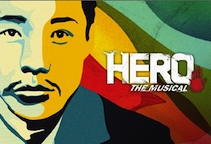
KOREAN BROADWAY (SORT OF)
Hero: The Musical starts off with a bang. Literally. Several loud gunshots tear holes into the front curtain, which cinematically transforms into a stellar Big Dipper that emblazons a rich blue sky. The constellation rises and the astonishingly exquisite beauty of a forest in 1909 appears. A soaring, powerful male ensemble passionately sings in Korean about Korea’s quest for independence from Japan, but when they do, the entire proceedings are so riveting and the design elements so striking that it feels almost unjust to look up at the supertitles. But a few scans of almost unintelligible dialogue (“I have devoted all my youth. But when I was there, I was too insensitive. When I missed it badly after I had left, it was too late”) and what started as riveting, almost mind-blowing tech theater at its very best quickly fell into a living sampling of the best and worst attributes of modern musical theater.
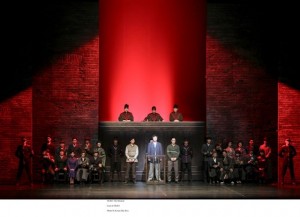 Perhaps because Hero was commissioned to commemorate the 100th Anniversary of the death of the patriotic leader An Chunggun, the Korean producers eschewed storytelling for “Broadway Style Musical;” and, indeed, as far as spectacle goes, they’ve achieved greatness. But in order for Broadway Musical Theater to truly excel, any story needs a strong libretto, score, and lyrics to provide a well-built foundation for the technical theater aspects. Without them, that famous Broadway proverb rings truer than ever: the audience won’t leave humming the scenery. But to be fair, this was largely a Korean audience watching a hugely patriotic tale about a legendary Korean hero whose remains have yet to be found, though his legacy as a hero lives on in his homeland of Korea. The libretto and lyrics consist of one message from beginning to end, mostly blind patriotism of the kind found in Cabaret‘s “Tomorrow Belongs to Me.” Such propaganda never develops forward into a dramatic literary structure, but rather remains cliché and one dimensional throughout, which eventually (and shockingly to this American reviewer) leads to thunderous applause when Ito Hirobumi, influential leader in the Japanese invasion of Korea, is assassinated.
Perhaps because Hero was commissioned to commemorate the 100th Anniversary of the death of the patriotic leader An Chunggun, the Korean producers eschewed storytelling for “Broadway Style Musical;” and, indeed, as far as spectacle goes, they’ve achieved greatness. But in order for Broadway Musical Theater to truly excel, any story needs a strong libretto, score, and lyrics to provide a well-built foundation for the technical theater aspects. Without them, that famous Broadway proverb rings truer than ever: the audience won’t leave humming the scenery. But to be fair, this was largely a Korean audience watching a hugely patriotic tale about a legendary Korean hero whose remains have yet to be found, though his legacy as a hero lives on in his homeland of Korea. The libretto and lyrics consist of one message from beginning to end, mostly blind patriotism of the kind found in Cabaret‘s “Tomorrow Belongs to Me.” Such propaganda never develops forward into a dramatic literary structure, but rather remains cliché and one dimensional throughout, which eventually (and shockingly to this American reviewer) leads to thunderous applause when Ito Hirobumi, influential leader in the Japanese invasion of Korea, is assassinated.
Even the press release is patriotic, calling director Ho Jin Yun legendary and the father of musical theater in Korea. But we are not in Korea; we are at Lincoln Center where those supertitles persistently confirm how notoriously difficult it is to translate Korean into English. Without the built-in patriotism of another’s mother country, a perplexing score, and overwrought themes, it is difficult to wrap your heart around Hero. But your eyes and ears are well-supplied with highly impassioned performances, skillful dancing, exciting choreography (Ran Young Lee), and stunning stage pictures. Without question, Yun sure knows how to put on a show.
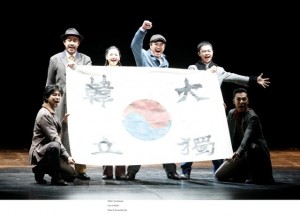 When Sorhui (the heroine played by Lee Sang Eun) sings from a bridge in front of a star-filled night with slow moving fog from below, the scene before us is a Kodak moment. And such moments only get more astounding, such as when Sorhui stands between two speeding train cars with her clothes blowing in the wind as snow projects across the scene. Most impressive is when a crowd of spectators watches a speeding train enter the station platform, which, in a flash, goes from a projection to a real train! Scenic designer Dong Woo Park, costume designer Ji Yeon Kim, lighting designer Yun Young Koo, and special effects designer Kwang Nam Park are the Rembrandts of the theater. Design students and tech theater fans alike should rush to witness such theatrical magnificence.
When Sorhui (the heroine played by Lee Sang Eun) sings from a bridge in front of a star-filled night with slow moving fog from below, the scene before us is a Kodak moment. And such moments only get more astounding, such as when Sorhui stands between two speeding train cars with her clothes blowing in the wind as snow projects across the scene. Most impressive is when a crowd of spectators watches a speeding train enter the station platform, which, in a flash, goes from a projection to a real train! Scenic designer Dong Woo Park, costume designer Ji Yeon Kim, lighting designer Yun Young Koo, and special effects designer Kwang Nam Park are the Rembrandts of the theater. Design students and tech theater fans alike should rush to witness such theatrical magnificence.
But here’s what you’ll have to put up with: Hero: The Musical, in essence, is a long list of derivations from imported British musicals: The opening scene in the forest is fairly reminiscent of Martin Guerre; the Japanese police inspector who dedicates his life to catching the musical’s hero An Chunggun (handsome and powerful Chung Sunghwa) is like Javert from Les Misérables, and a café scene turns into “Master of the House,” also from Les Miz.
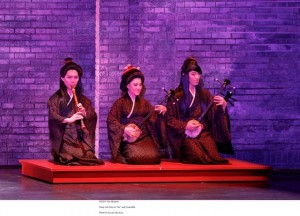 But wait, there’s more. The introduction of Hirobumi (compassionate Kim Sunggee) sounds an awful lot like Chess; when Lingling (adorable Jeon Mido) is shot, she sings in the arms of her first love, mirroring Miss Saigon; an impassioned political speech conjures up Evita; a courtroom scene feels like Jesus Christ Superstar; and when Chunggun imagines his dreamlike mother, dammit if it isn’t Billy Elliot.
But wait, there’s more. The introduction of Hirobumi (compassionate Kim Sunggee) sounds an awful lot like Chess; when Lingling (adorable Jeon Mido) is shot, she sings in the arms of her first love, mirroring Miss Saigon; an impassioned political speech conjures up Evita; a courtroom scene feels like Jesus Christ Superstar; and when Chunggun imagines his dreamlike mother, dammit if it isn’t Billy Elliot.
And we’re still not done yet. While not derivative of a British import, the chase sequence through the streets is pure West Side Story as dancers move toward us while jumping over their own hands. Perhaps the creators are paying homage to Jerome Robbins and British musicals, but there hasn’t been this much tribute to so many Broadway musicals in one Broadway musical since Urinetown (which had very few sets to hum, but some killer songs).
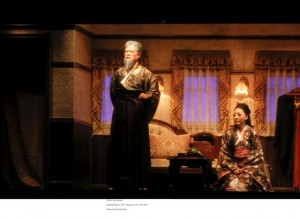 Hero’s score is at its strongest when Korean and Japanese music are layered with grand opera. With the fanfare at the train station, the dance of the Japanese soldiers, and numerous heartfelt arias, the ears are in for a magnificent treat. At other times, sadly enough, the score strives for over-amplified contemporary pop, and the sound becomes perplexing for 1909 (whereas Les Miz’s score was consistent pop).
Hero’s score is at its strongest when Korean and Japanese music are layered with grand opera. With the fanfare at the train station, the dance of the Japanese soldiers, and numerous heartfelt arias, the ears are in for a magnificent treat. At other times, sadly enough, the score strives for over-amplified contemporary pop, and the sound becomes perplexing for 1909 (whereas Les Miz’s score was consistent pop).
If you wish to support the musical theater from our Korean brothers and sisters, avoid reading the supertitles. Read the synopsis in the program and, like Shakespeare for some or Opera for others, what you don’t understand may not get in your way. Hero looks and sounds so damn beautiful that some may be glad to celebrate and embrace this astounding technological achievement. There’s just no guaranteeing patriotism.
photos by Kwan-Hee Ryu
Hero: The Musical
Lincoln Center – David H. Koch Theater
20 Lincoln Center Plaza
ends on September 4, 2011
for tickets, call 212.721.6500 or visit Koch Theater
